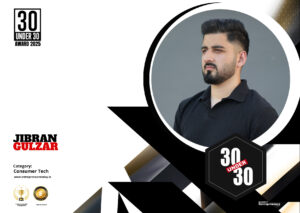
“As a kid, I’d joke with my friends about how amazing it would be to have food delivered via an app. So I decided to build that dream right here.”
Hailing from Srinagar, Jibran Gulzar’s journey as an entrepreneur began after a Computer Science degree at Chandigarh University in 2019.
Late one night during his university days, he ordered a burger for ₹200 only to realise it cost ₹110 in the restaurant. “I noticed a major difference between in-restaurant prices and prices on food delivery apps. That didn’t make sense to me, and it made me curious. I started digging deeper and realised that the pricing structure on these platforms was fundamentally unfair to both customers and restaurant partners,” he recalls.
By 2020, Jibran noticed that major food delivery platforms had shifted focus from empowering restaurants to charging them steep commissions of 30–35%, making it unsustainable for local businesses. He envisioned a platform that put restaurants first, offering fairness and control. In the same year, amidst the unique challenges of operating in Kashmir, including political instability and limited internet access, he launched Gatoes. What began as a simple delivery platform quickly grew into one of J&K’s most downloaded apps.
Over time, Gatoes evolved into a restaurant-first delivery ecosystem and is now transitioning into a SaaS-driven model, offering restaurants powerful tools to manage their deliveries independently. Unlike traditional platforms, Gatoes charges a simple, flat monthly SaaS fee, with absolutely no commissions on orders.
Keeping Competitors on Their Toes
What is different about Gatoes is the business model. To explain better, Jibran talks about the current trend in the market for increasing revenue. He explains,
“If a platform wants to show a 50% revenue jump, instead of increasing sales, they just hike commissions. Restaurants, in turn, increase menu prices, and users end up paying more. This creates an illusion of growth, but it’s deeply unfair. We didn’t want to be part of that.”
That mindset led to Gatoes’ unique SaaS-based business model, where restaurants pay a simple, flat monthly fee for access to tools and services, without giving up a percentage of every sale. There are no hidden commissions, no price manipulations, and complete transparency. It’s a model that puts power back in the hands of local businesses and one that’s designed to scale sustainably.
Owing to Gatoes’s transparent pricing, restaurant partners tell Jibran they sleep easier knowing their margins won’t vanish overnight. By spending almost nothing on marketing and leaning on word‑of‑mouth, Gatoes has delivered an 88‑fold return on every rupee invested.
Speaking of investments,
“We launched in 2021 and raised our pre-seed round in 2022. Our first investor, Mr. Qazi, the founder of BQE Software, was the one who truly believed in our mission when it was just a vision, and for that, we’re immensely grateful. His early trust gave us the confidence to keep pushing forward. One of his quotes that continues to inspire us is, ‘If you want to build something for the masses, the best day was yesterday, but the second-best time is today.’ That mindset fuels our journey every day. Since then, we’ve raised two additional rounds from other investors who share our belief in what Gatoes is set to become.”
The Challenges
Jibran’s path with Gatoes has been nothing short of a battlefield. Early on, many restaurants balked at a flat‑fee model when they were used to paying high commissions. In response, he spent a year refining the concept, running deep analyses, placing hundreds of test orders, and starting with 150 local eateries.
That groundwork paid off. Today, Gatoes serves over 1,200 of the 3,000 restaurants it lists. Owners appreciate the fact that they know their costs up front, whether they process ten orders or a hundred.
Jibran recalls starting Gatoes during a time when Kashmir’s internet infrastructure was heavily restricted by the government. For months, even basic connectivity was a struggle, WhatsApp barely worked, and the region operated on slow and unstable 2G. “People think 2G gives you 100 kbps, but we were lucky to get even 10–20 kbps on most days,” he says.
“I had to explain to our developers that we weren’t building for high-speed cities. We were building for a region under digital lockdown. We had to design everything for ultra-low bandwidth with minimal images, compressed content, and a tech flow that could work under extreme limitations,” he recalls.
Full 4G services were restored only in early 2023, nearly two years after the launch. Still, the team managed to build and launch the app in just six months. “It wasn’t easy to scale in a digitally choked environment,” he admits, “but we made it work because the need was urgent, and the mission was personal.”
Moreover, the societal attitudes and political hurdles slowed him at every turn. Securing a labour licence took years of proving the business. He reflects,
“If I had built the same company in Bangalore or Delhi, I might have grown 10x faster. But here, it’s incredibly tough.”
Funding was another challenge. With just ₹1 lakh borrowed from a friend, Jibran travelled across India for developers who could deliver a 2G-friendly app. Building Gatoes in six months under those conditions felt impossible. Additionally, since no Rapido or Porter existed locally, he assembled his own delivery fleet from scratch.
The Wins
One of the major milestones for Gatoes was becoming the most downloaded app in Jammu & Kashmir, a feat no other startup in the region has matched. Within just a few months of launch, the platform demonstrated real market fit and began generating strong revenues.
Today, Gatoes runs at a robust 9-figure GMV, processing thousands of orders daily, with a passionate team of over 110 members spread across 12 districts in Kashmir and one in Jammu. Beyond being a tech platform, Gatoes has become a symbol of local innovation for creating jobs, building digital infrastructure, and proving that world-class startups can rise even from the most unexpected corners.
Despite offers of acquisitions from major players, Jibran and his investors chose to stay independent. The company has also earned recognition from the various government bodies, including the Ministry of Home Affairs.
Feedback has been overwhelmingly positive. Gatoes boasts a high Net Promoter Score among its partners, many of whom now recommend Jibran’s platform over larger competitors. Perhaps the proudest milestone is job creation, having provided stable work for hundreds of local people.
In 2023, Jibran became the first Kashmiri listed in Forbes 30 Under 30 Asia, selected after a correspondent reviewed the growth of Gatoes from a 2G-era startup to outperforming major platforms. That recognition led to invitations in Singapore, Botswana, and Ohio, where he connected with peers and mentors like the founders of Instacart. His story also caught the eye of global and national media. He was featured in Fox Story, Entrepreneur, and The Economic Times.
Plans Ahead
“We’re building for that future.”
Jibran says that while Gatoes may not be widely validated today all across India, five to six years down the line, people will realise why a platform like this is necessary.
Being already well-established in Kashmir, the company is now looking to expand into Jammu and then move toward the northern belt of the country. Jibran is also eyeing five key business states where other hyperlocal companies operate, like Bengaluru, Mumbai, Kolkata, Delhi, and Chandigarh. He further adds,
“We’ve been fine-tuning this business model for the past three and a half years, and we’re finally at a stage where we feel confident enough to take it to these bigger markets. Our immediate plan is to launch in one mainstream state, secure some funding, and then scale to the other four, eventually expanding across the rest of the country.”
Being an Entrepreneur
Jibran believes that every second person in Kashmir is an entrepreneur at heart. In a region so isolated from the mainstream, even becoming a doctor or engineer feels like breaking through the impossible. Naturally, people here are wired to hustle to build something of their own, however small.
“The key,” he says, “is to just start. That’s what I did. If I had sat around thinking, ‘There’s 2G, there’s no internet, how will I do this?’ I’d still be thinking. But once you get obsessed with solving a real problem, the ‘how’ begins to unfold on its own.”
Jibran speaks of resilience. The kind that pushes you through weeks without validation, when your friends seem to be sprinting ahead in life while you’re buried in broken code, missed projections, tight cash flow, and 2 AM bug fixes and uncertainty. The kind of quiet endurance that founders rarely talk about, but all must live through.
As he signs off, his voice softens but sharpens with clarity:
“You may not have perfect conditions. You may not even have odds on your side. But if you stay obsessed with your mission, if you build for your people, it will all click. Just keep going. That’s what real entrepreneurs do. They build anyway. Don’t wait for the right time. Just be the reason something right begins. The world doesn’t need perfect; it needs brave.”







